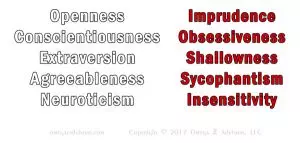How to Use Bad Personality Traits to Assess Personalities
- Understanding The Big Five Personality Traits For Use At Work
- Openness Personality Trait Unwrapped and Uncovered
- Conscientiousness Personality Trait Detailed and Perfected
- Extraversion Personality Trait Exposed and Exhibited
- Agreeableness Personality Trait Aligned And Affirmed
- Neuroticism Personality Trait Calmed and Cooled
- How to Use Bad Personality Traits to Assess Personalities
- Conscientiousness Personality In The Workplace And On The Team
Assessing personalities is subjective. Where one sees a good trait another sees a bad one. This fact puts bad personality traits to good use in assessing personalities.
The Good Nature of Bad Personality Traits
For instance, consider “strong.” It’s usually good to see this in someone. However, if someone does not like the person, he will likely see it in a bad light. That means he will see it more like “domineering,” “stubborn,” “rigid” or many others.
In a similar light, one might see “superficial” where another sees “friendly.” One might see “rustic” another “dirty.” Where one sees “cooperative” another sees “conformist.” This goes on and on for any trait.

Understanding how bad personality traits relate to good ones helps us to assess personalities in more situations.
How Bad Personality Traits Help Assess Personalities
This fact becomes helpful in making use of bad personality traits because:
- We won’t like everyone we meet.
- Others won’t like everyone they tell us about.
If we don’t like someone, we are more apt to see them as domineering let’s say. Thus, if we do an assessment of her personality, we won’t do a good job. That’s because we’re not thinking how others might see her.
If another tells us that someone is domineering, we learn two things. First, she likely dislikes this someone since domineering has a negative connotation. Second, we and others might see him as strong. In short, in a sense, bad personality traits help us translate personalities.
This has great value. We don’t always know the personalities involved in a project for instance. We also aren’t always able to meet them either. So, hearing how others describe others may be our only way to assess personalities.
The Big Five Bad Personality Traits
To make further sense of this, this series shows how the traits of the Big Five could be bad personality traits. So, if someone says another “has difficulty focusing,” we can suspect she might score high in openness. “Superficial” could mean extraversion. “Conformist” could mean agreeableness and so forth.
Again, this reverse engineering of bad personality traits allows us to see how others might see the same person. It also allows us to begin making assessments of those we can’t meet in person. While they won’t be as accurate as in-person ones, they still help.


